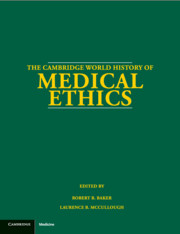Book contents
- Frontmatter
- PART I AN INTRODUCTION TO THE HISTORY OF MEDICAL ETHICS
- PART II A CHRONOLOGY OF MEDICAL ETHICS
- PART III DISCOURSES OF MEDICAL ETHICS THROUGH THE LIFE CYCLE
- PART IV THE DISCOURSES OF RELIGION ON MEDICAL ETHICS
- PART V THE DISCOURSES OF PHILOSOPHY ON MEDICAL ETHICS
- PART VI THE DISCOURSES OF PRACTITIONERS ON MEDICAL ETHICS
- PART VII THE DISCOURSES OF BIOETHICS
- PART VIII DISCOURSES ON MEDICAL ETHICS AND SOCIETY
- Ethical and Legal Regulation of Medical Practice and Research
- B Medical Ethics, Imperialism, and the Nation-State
- 52 Colonialism, Imperialism, and the History of Latin American Medical Ethics
- 53 Japanese Doctors’ Experimentation, 1932–1945, and Medical Ethics
- 54 Medical Ethics and Nazism
- 55 Medical Ethics and Communism in the Soviet Union
- 56 Medical Ethics and Communism in Eastern Europe
- 57 The Ethics of Military Medical Research in the United States during the Cold War
- 58 Medical Ethics and the Military in South Africa during Apartheid: Judging History
- C Medical Ethics and Health Policy
- Appendix: Biographies: Who Was Who in the History of Medical Ethics
- Bibliography
- Index
52 - Colonialism, Imperialism, and the History of Latin American Medical Ethics
from B - Medical Ethics, Imperialism, and the Nation-State
Published online by Cambridge University Press: 28 May 2012
- Frontmatter
- PART I AN INTRODUCTION TO THE HISTORY OF MEDICAL ETHICS
- PART II A CHRONOLOGY OF MEDICAL ETHICS
- PART III DISCOURSES OF MEDICAL ETHICS THROUGH THE LIFE CYCLE
- PART IV THE DISCOURSES OF RELIGION ON MEDICAL ETHICS
- PART V THE DISCOURSES OF PHILOSOPHY ON MEDICAL ETHICS
- PART VI THE DISCOURSES OF PRACTITIONERS ON MEDICAL ETHICS
- PART VII THE DISCOURSES OF BIOETHICS
- PART VIII DISCOURSES ON MEDICAL ETHICS AND SOCIETY
- Ethical and Legal Regulation of Medical Practice and Research
- B Medical Ethics, Imperialism, and the Nation-State
- 52 Colonialism, Imperialism, and the History of Latin American Medical Ethics
- 53 Japanese Doctors’ Experimentation, 1932–1945, and Medical Ethics
- 54 Medical Ethics and Nazism
- 55 Medical Ethics and Communism in the Soviet Union
- 56 Medical Ethics and Communism in Eastern Europe
- 57 The Ethics of Military Medical Research in the United States during the Cold War
- 58 Medical Ethics and the Military in South Africa during Apartheid: Judging History
- C Medical Ethics and Health Policy
- Appendix: Biographies: Who Was Who in the History of Medical Ethics
- Bibliography
- Index
Summary
INTRODUCTION
America's conquest by Spaniards – la Conquista – took more than six decades, from discovery in 1492 to the execution of the Araucanian rebel, cacique Caupolicán, in 1557. During this period, the Spanish engaged in a political and legal debate over the status of new lands as property, which was accompanied by a philosophical and theological debate over the justification of war to take Spanish possession of the territories and the moral status of the indigenous population. Overlaying this was an even more sophisticated argument about the ontological reasons concerning whether indigenous peoples had dominion over themselves and, thus, were not to be enslaved. These discussions occurred contemporaneously with two devastating events, the radical and rapid depopulation of indigenous peoples in the Americas known as the “Americas’ demographic catastrophe,” and the near simultaneous depopulation of many African tribes as their people were enslaved to facilitate the economic exploitation of the “New World.” After their military and political conquest of Latin America, with its maleficent consequences, the Spaniards introduced sanitary measures and hospital developments to provide health services to the population as an expression of the Christian virtue of charity. Spanish colonialism in Latin America emerged from the conquest and is a complex social and moral phenomenon.
During the nineteenth century, European intellectual influence changed colonial medical ethics, as Latin American physicians, emulating the unification of medical art with the scientific experimental method practiced in Britain, France, and Germany, found a new source of intellectual and moral authority.
- Type
- Chapter
- Information
- The Cambridge World History of Medical Ethics , pp. 581 - 588Publisher: Cambridge University PressPrint publication year: 2008



